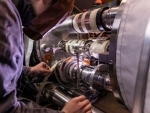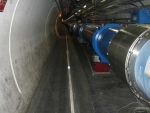LHC prepares for new achievements
Geneva, Dec 3 (IBNS): Early this morning, operators of the CERN Control Centre turned off the Large Hadron Collider (LHC), ending the very successful second run of the world’s most powerful particle accelerator. CERN’s accelerator complex will be stopped for about two years to enable major upgrade and renovation works.
LHC experiments delve deeper into precision
Geneva and Venice, July 11 (IBNS): The world’s particle physics community is meeting this week in Venice (Italy) for the EPS International Conference on High Energy Physics. Dozens of new results from the full existing datasets of the Large Hadron Collider experiments are being presented for the first time.
CERN celebrates completion of Linac 4, its brand new linear particle accelerator
Geneva, May 9 (IBNS): At a ceremony on Tuesday, CERN inaugurated its linear accelerator, Linac 4, the newest accelerator acquisition since the Large Hadron Collider (LHC). Linac 4 is due to feed the CERN accelerator complex with particle beams of higher energy, which will allow the LHC to reach higher luminosity by 2021.
The LHC collides ions at new record energy
Geneva, Nov 25 (IBNS) After the successful restart of the Large Hadron Collider and its first months of data taking with proton collisions at a new energy frontier, the LHC is moving to a new phase, with the first lead-ion collisions of season 2 at an energy about twice as high as that of any previous collider experiment.







